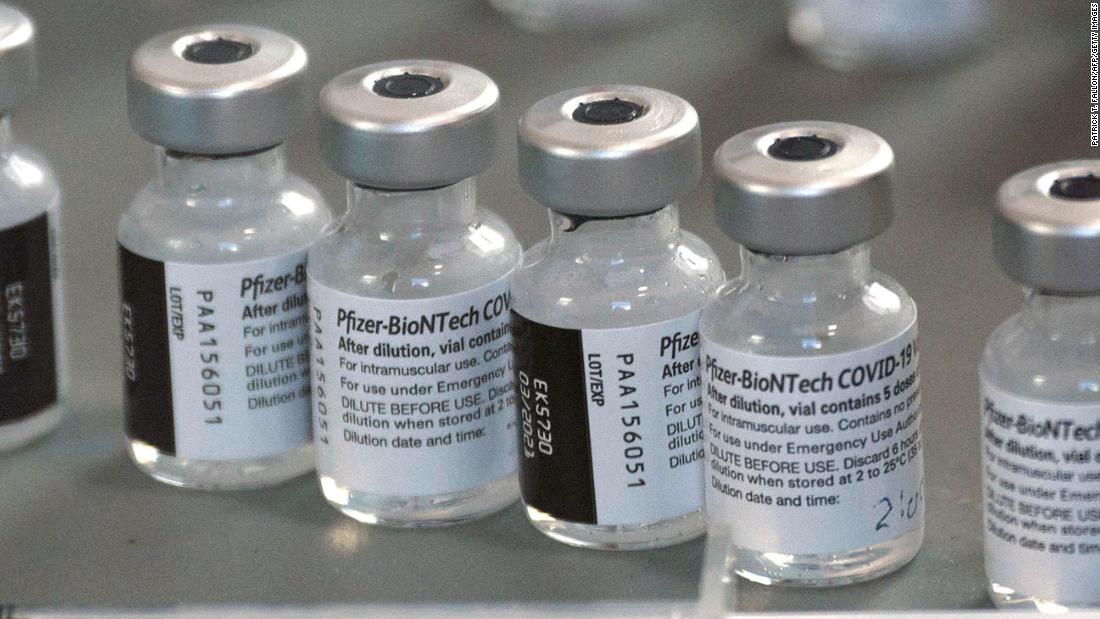(CNN) — They didn’t have to die.
This is the dire truth of America’s new pandemic battlefront, as the fierce and highly infectious delta variant emerges, targeting millions who sadly left everything too late to protect themselves with safe, free and effective vaccines.
Michael Freedy, a Las Vegas father of five, could still be the light of his children’s lives. Instead, they will always be haunted by one of his heartbreaking final messages before he died on Thursday: “I should have gotten the damn vaccine.”
Kim Maginn, a 63-year-old Arkansas grandmother and fitness enthusiast, should still have years to watch her family grow. Instead, her daughter, Rachel Rosser, a nurse, wonders why she couldn’t convince her late mother to get vaccinated.
“I’m angry that she didn’t get vaccinated. And I personally feel guilty for not trying harder,” Rosser said.
Unfortunately, Maginn had reasoned that if he was going to get COVID he would have already had it.
The loved ones of the deceased are not alone in their moving laments.
Some of those who survived a battle with COVID-19, after long days struggling to breathe or laden with debilitating side effects, wonder why they didn’t take a simple step to spare themselves and their loved ones the nightmare.
Ganeene Starling, a Floridian with eight children, shuddered to think what would have happened to her 6-year-old son if she hadn’t gotten over what she said was a “horrible” spell in the intensive care unit. He admitted to hearing people say that the government was forcing people to fill their bodies with an untested substance.
“I was one of those people who said, ‘I can’t believe people are just injecting this drug into their body that we don’t know enough about,'” said Starling, 43. “Now I’m like, ‘It’s just a vaccine. Just get the stupid vaccine.'”
“That vaccine could have stopped all of this. Just a little injection. I feel silly for not getting it.”
As Alicia Ball sat by her husband William’s bed, where he slept exhausted with an oxygen mask last week, she said vaccinations had been delayed. But he told CNN from Mississippi: “I would not wish this on or on my worst enemy.”
A great tragedy
As infections rise, fueled by the delta variant of covid-19, these devastating stories of unnecessary human loss and grief shared in recent days with CNN anchors and reporters, including John Berman, Martin Savidge, Randi Kaye, Miguel Márquez , Chris Cuomo and others, will be repeated thousands of times. Some of those who gave testimony agreed to speak even while grieving and experiencing personal agony, to help others avoid that fate.
The vast human tragedy of the pandemic, with more than 600,000 American deaths alone, was already almost unbearable. But many of those who died in previous waves of illness had no chance.
Some succumbed to comorbidities that left them vulnerable to COVID-19, a disease for which few effective therapies exist. Others fell ill after not taking the disease, and advice from government scientists on social distancing, seriously enough. Many were simply unlucky and condemned to their fate by biology or chance.
But the idea that many of those tragedies can now be avoided, but won’t because, for whatever reason, millions of American adults will not be vaccinated, may herald the most painful phase yet of this cursed global emergency.
Most people who contract COVID-19 will not yet die or become seriously ill, a factor that has clearly influenced the calculations of many in the country who are suspicious of public health councils or think that the worst will not happen to them.
But the latest data from the U.S. Centers for Disease Control and Prevention (CDC), combined with the fierce march of the delta variant, they weigh the calculation even more to get vaccinated before it’s too late.
Despite all the talk of “post-vaccination infections”, only a small proportion of those who are vaccinated against covid-19 contract the virus. A smaller number get sick and need to go to the hospital. Even fewer die. So receiving vaccines, while not offering a 100% guarantee of survival – the fragility of human life mitigates that – offers enormous and surprising protection.
The CDC said Saturday, for example, that less than 0.004% of people who have been fully vaccinated against COVID-19 experience a post-vaccination case that results in hospitalization. Less than 0.001% died from the disease. While the count of those post-vaccination cases (6,587) and deaths (1,263) seems like a lot, they must be compared to the fact that more than 163 million people in the United States had been fully vaccinated against COVID-19 as of July 26.
And the CDC reported Monday that 70% of all American adults have received at least one dose of the covid-19 vaccine, hitting a benchmark goal that President Joe Biden hoped to reach just under a month ago.
Reasons for reluctance to vaccinate
Given the staggering success of vaccines, even as the delta variant besieges the country, the decision of many Americans to forgo life-saving protection is puzzling to those who have been vaccinated.
There are many reasons why people are reluctant. Some wanted to wait and see if there were any side effects over time for those vaccinated. Suspicion of the government runs deep in the American soul, undermining some of the Biden White House pleas for the people to go ahead and protect themselves.
In some parts of the country, largely unaffected by previous covid assaults that emptied the streets in large cities, there was a sense that the disease did not pose a serious threat. And since most people get better with their infections, there is a strong feeling that your chances are pretty good if you get sick, especially if you are young and have no pre-existing health problems.
In many cases, the pressure of work and busy lives cause some people to postpone their vaccinations.
Politics undoubtedly played a role as well. The fact that former President Donald Trump, despite presiding over an administration that helped fund vaccine development, so severely politicized COVID-19 and mocked the use of masks means that it can hardly be a coincidence that almost every state fewer vaccinated voted for him in November and are now heavily exposed to the delta variant.
Months of anti-vaccine propaganda by conservative news networks watched by Trump supporters stigmatized the vaccine for many. In Missouri, which is being hit by delta, CNN reported that some people are secretly receiving their vaccinations to avoid social and political pressure to be reluctant.
“They didn’t want to have to deal with peer pressure or other people’s outbursts about … ‘giving in to everything,'” Dr. Priscilla Frase, internist and chief medical information officer at Ozarks Healthcare in West Plains, told CNN’s Anderson Cooper.
Even now, many Republicans appear to be making the political decision to avoid the vaccine despite its potential to save lives. A Monmouth University poll released Monday found that 17% remain opposed to receiving the vaccine. Among that group, 70% identify or lean towards the Republican Party, while only 6% align with the Democrats.
The idea that anyone would not save themselves because they are listening to a politician (not just Trump) who is downplaying the pandemic to boost his own career, or a right-wing pundit raising his audience ratings, is a tragedy in herself.
But no matter the reason, it is increasingly clear that people who reject the vaccine are now at significant risk to their own lives and health, and to the well-being of those who could be left behind if they die. Since children under the age of 12 cannot yet be vaccinated, skeptics also run the risk of exposing the youngest and most vulnerable members of society to serious illness. Ultimately, they are making a bet on what Republican West Virginia Governor Jim Justice called “a lottery of death.”
‘Not worth it’
The vaccine controversy has re-exposed the deep political and social chasm that is opening up in the United States. And it raises the question of whether getting vaccinated is not just a personal choice, but a step that must be considered in terms of an individual’s debt to society.
This question is especially difficult for many doctors and nurses, who have spent more than a year surrounded by covid deaths in ICUs. Many share stories of people who refuse to believe they have COVID-19 even up to the time they are intubated. Others ask for the vaccine, although once you get sick it is too late.
“Some people insist that we are lying to them about their positive covid diagnosis, even sick people,” Nurse Morgan Babin told CNN last week in Louisiana, where the virus is rampant.
The reality of unnecessary death increases stress and damages the morale of many medical professionals as the nation prepares for another protracted battle against the virus.
“It is also very frustrating. We are also human. As doctors, nurses, respiratory therapists, etc., we basically have a miracle drug,” Dr. Murtaza Akhter, an emergency physician at Florida International University, told CNN’s Ana Cabrera. In the past week. “We have something that can help prevent infection and especially prevent serious infection altogether, and yet people refuse to receive it. And they have been asking for help but still rejecting the vaccine.”
“It’s absolutely ironic. It’s, frankly, very irritating.”
One patient who learned that lesson was Aimee Matzen, 44, who told CNN at a hospital last week that she was “furious” with herself because she was not vaccinated.
“(I) just don’t want anyone else to end up like me, especially when the vaccine is so easy to come by now,” he said.
Michael Freedy’s fiancee Jessica DuPreez, who received his vaccinations as soon as he tested positive, told CNN’s Berman on Monday that she believes he would still be alive if he had been vaccinated.
“Yes, I think at least it would have lessened the symptoms and he could have fought longer and had a better chance,” she said. DuPreez said the loss of Freedy, 39, still feels surreal. Your 7-year-old son is still texting on his phone. “The first was: Dad, are you still alive?” He said on “New Day.”
“Those of you who are doubting and thinking ‘it can’t happen to me because I’m young’ … It can happen to you and then you will sit and wonder why you didn’t get vaccinated and you won’t be able to hug your child again. family”.
“Not worth it.”
–


